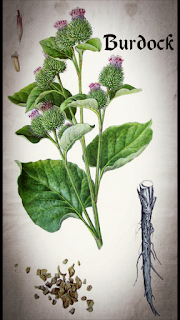Herbal Medicine: Garden Sage
Among all the plants and their various medicinal uses, Sage should not be overlooked.
With properties including antibiotic, antiseptic, astringent, antiallergic, and antispasmodic; Sage has a lot of good medicine to offer us!
Native to the Mediterranean, Sage was considered sacred to the Romans. In the 1st century C.E. Sage was noted by the Greek Physician Dioscorides to have stopped wounds from bleeding, and to clean ulcers and sores. Furthermore, he noted that Sage juice in warm water effectively treated sore throats & coughs.
Cultivated in ancient monestary gardens, Sage has been considered invaluable by traditional healers for centuries. Used in oral health, keeping peoples mouths clear of infection.
Sage has been implemented externally for the treatment of sprains, swelling, ulcers and bleeding.
Internally, Sage is useful for treating rheumatism, nervous system support, reducing delirium associated with fever, reduces night sweats, dries up a mother's milk when weaning, & helps with immune system support to fight off the common cold and flu.
In Germany, Sage is prepared as a medicine in extracts, tinctures, and essential oils for mouth, throat, & gastrointestinal remedies.
Sage has also been used to treat infections, dental abscesses, infected gums & mouth ulcers, and has been shown to be effective against Staphylococcus Aureus.
Sage was one of the ingredients in "Four Thieves Vinegar," which was used to ward off the plague; also being used to treat snakebites.
Sage can also he useful on calming down asthma attacks when inhaled in a steam.
Among other things, Sage aids in relieving pain & symptoms associated with menstruation. It also helps remove mucus from airways and prevents secondary infections from setting in.
Useful against indigestion, Sage stimulates upper digestion, intestinal mobility, bile flow, and pancreatic function.
Sage is a brain stimulant, helping to improve memory and concentration. It contains calcium, potassium, magnesium, zinc, and vitamins C & B-complex.
Do not exceed three cups of Sage tea a day. Do not use medicinal dosages when pregnant, or breastfeeding unless you're trying to dry up your milk production. Avoid Sage as medicine if you are Epileptic.
Added to the U.S. Pharmacopoeia in 1840, and still there.
A great aid in menopausal symptoms.
Sage is yet another herb that would serve you well in your garden & kitchen!
To a happier & healthier you!
~Tanya Capps~
Herbal Witchcraft Magazine
https://www.herbalwitchcraftmagazine.com




Comments
Post a Comment